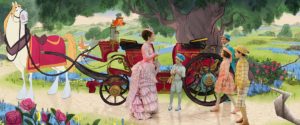It’s a testament to just how good MARY POPPINS RETURNS is that the weakest part of this sequel to the 1964 film is the sequence with Meryl Streep. I hasten to point out the relative nature of the word “weakest”. Like everything else in this practically perfect cinematic exercise, it’s eye-popping and clever as the characters dance their way around a quaint upside-down shop at the end of an alley usually inaccessible to mere mortals. (Yes, it’s a tacitly respectful nod to that >other< wildly popular children’s book series.) And as for La Streep, she’s delightful as a distant Poppins relative sporting distinctive eye-makeup and an unidentifiable accent. It’s just the way the interlude seems more like a layover than a way to keep the action moving along.
Never mind.

Emily Mortimer, Ben Whishaw, Emily Blunt
The new adventures of the Banks family are pure magic, though the circumstances surrounding the now-grown Banks children, Michael and Jane (Ben Whishaw and Emily Mortimer) are anything but. Widower Michael has become an artist still mourning the death of his beloved wife a year ago, leaving his supremely self-possessed pre-teen daughter, Anabel (Pixie Davies) to shoulder the responsibilities of supervising her two brothers, twin John (Nathanael Saleh) and doughty baby brother, Georgie (Joel Dawson) while helping to run the household at 17 Cherry Tree Lane with the help of labor organizer Aunt Jane and the redoubtable housekeeper Ellen (Julie Walters), still doing melodramatic battle with the family kitchen. Unfortunately, it’s not enough, and when Michael misses three payments in a row for the mortgage he took out to pay his late wife’s medical bills, they are all faced with the bank repossessing their home. Only finding the family’s share certificates will save the day, but the basement to attic search though decades of clutter only turns up the vintage kite that the Banks children flew as children (and with which the original film ended). When Georgie finds it discarded in a dustbin, he immediately takes it for a flight and reels in none other than Mary Poppins (Emily Blunt) herself, back to save the day.

Blunt, Joel Dawson, Pixie Davies, Nathanael Saleh, Lin-Manuel Miranda
Blunt will, invariably, be compared to Julie Andrews, and she proves herself more than worthy. There is the implacable self-assurance and equally implacable strict sense of maintaining discipline and order tempered with compassion and just a hint of vanity. There’s also twinkle of mischief beneath the starchy exterior. The film, too, proves itself worthy of the original. It is replete with call-outs (yes, dancing penguins), with dazzling productions numbers that hearken back to those that came before, but only to expand on that whimsical universe, the way Jane’s social activism builds on her mother’s demonstrating for women’s suffrage at the turn of the century. Chimney sweeps and their roof-top dance give way to lamplighters, led by Jack (Lin-Manuel Miranda), who perform gravity-defying feats of dancing-do on lampposts, bicycles, and an assortment of outdoor furniture, while the kite finale of the original hinges on balloons this time (I’m not giving anything away here). In between there are visits to the astonishingly complex world found on and in a Royal Doulton china bowl, a sweetly nascent romance between a Jane and Jack, and Mrs. Banks’ old Votes for Women sash still keeping that relic of a kits aloft.
The race at the end to save the say unfolds with a fair amount of predictability, but executed with such spirit, timing, and verve it become immaterial, so deftly does it throw red-herrings of impediments at us while moving along at a pace that is breakneck. The whole is set to music that continues the legacy that the Sherman Brothers created with the original, a fact of which we are assured with Miranda singing “Under Lovely London Skies” as the film opens. It doesn’t overstate things to opine that both are instant classics, and that’s before we get to Michael’s heartbreaking ballad of a tribute to his wife (who knew Wishaw could sing so well?), and an underwater adventure at bath time replete with and outsize rubber ducky and bubble-generating dolphins.
MARY POPPINS RETURNS is a bold effort on several levels, and it proves just how satisfying it can be when fortune favors that kind of endeavor. There are sterling performances replete with heart, but not saccharine, and embracing the eccentricities each character has with a tender compassion. As if it couldn’t get any better, it seamlessly invests in cultural inclusion that would not have been the norm in the 1930s, and offers us Colin Firth as a bank manager who embodies everything wrong with capitalism. As with the novels, which were explorations of sophisticated spirituality as well as the orderly raising of children, MARY POPPINS RETURNS presents a sophisticated dissection of society that transcends the standard musical confection. It’s a thing of beauty, intelligence, and social consciousness that evokes not just a sense of wonder, but also of infinite the possibilities that changing a point of view can provide. And it all goes down as easily as if it were accompanied by a spoonful of sugar.
Your Thoughts?